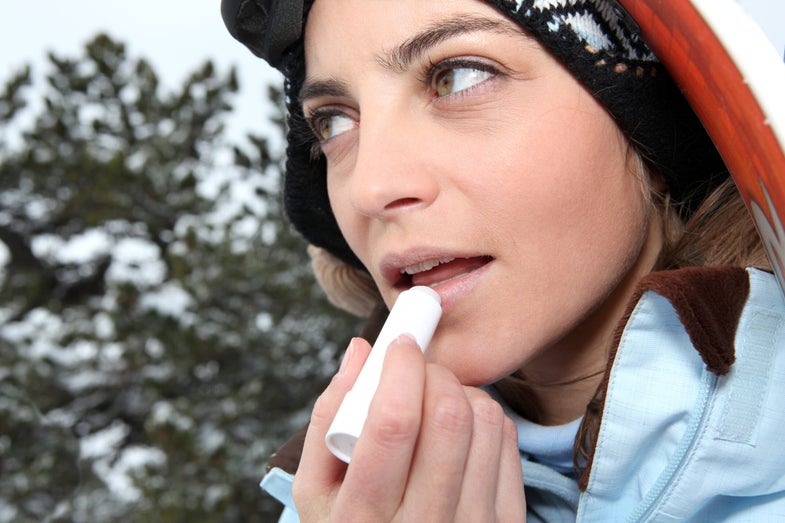How to keep your skin from falling off this winter
Skincare advice for our favorite chaps.

After spending the weekend in sub-zero weather, my lips are so chapped I can’t even think of a joke about how chapped they are. The state of my lip skin is frankly no laughing matter at this time. But luckily, there are ways to avoid losing your skin to a brutal winter.
Why does my skin give up on being skin every winter?
In theory, your skin—your largest organ—serves to keep water sealed within your body. But even if your skin is usually dewy and perfect, it probably flakes on the job a bit during the winter months.
Cold air can’t hold as much water as warm air can, so as the temperature goes down the absolute humidity drops, too. If the air around your skin is drier than the skin itself, it can leech your precious fluid away without you even noticing. Meanwhile, a harsh gust of wind can help strip away the natural oil that usually protects your skin from losing too much water.
Things are actually worse inside. All that cold, dry air gets warmed up by your heater, which means it suddenly has a huge capacity to hold moisture again. Your skin is downright drenched in comparison, and will give up H2O as it tries to reach equilibrium with the ambient air.
Because you’re not hot and sweaty, you’re less likely to realize you’re getting dehydrated. In fact, you’re prone to do all sorts of things that make the problem worse, like taking hot showers that strip away your moisturizing oils and sitting in front of desert-dry space heaters.
The drier your skin gets, the more vulnerable it is to the deleterious effects of winter air. Before you know it your whole body is itchy, flakey, cracked, and bleeding.
Step 1: Hydrate
Dehydration makes your skin dry, but it isn’t good for the rest of your organs, either. You can’t actually fix dehydrated skin just by drinking water, but you’re not doing yourself any favors by staying parched. Get a humidifier if you can, or improvise with the old bowl-of-water-on-the-radiator trick. And start carrying around a reusable water bottle.
Step 2: Avoid harsh soaps and hot showers
When the winter winds are blowing, there’s nothing quite like a steamy shower. Unfortunately, hot water dries out skin by stripping away oil—in the long run, you’re better off shortening and cooling your bathing routine. If you can’t stand to give up near-boiling water in the shower, at least turn down the temp when you wash your hands. It’s not like that hot water is killing more bacteria, anyway.
Ditching harsh soaps and cleansers is also a good idea. You should try to avoid face washes or serums that promise lots of exfoliation or contain acne-targeting acids, which will leave skin stripped. Even your standard bar of soap might cause trouble in the winter months. Look for cleansers that contain added moisturizers, especially ones meant for sensitive skin.

Step 3: Cover yourself in vaseline?
Why doesn’t guzzling water lead directly to perfectly moist skin? Your blood vessels only actually deliver moisture to the middle layer of the skin, the dermis (it sits above the hypodermis and below the epidermis). Keeping yourself hydrated means your body has something to offer the dermis, but that won’t stop the moisture from escaping up and out of the epidermis if the skin is dry and unprotected.
The best way to keep water in is to use a moisturizer that provides a physical barrier—occlusives like vaseline. They prevent almost all water loss, so slathering on one of these greasy concoctions after a shower is hands down the most effective way to keep your skin from falling off all winter.
Of course, these thick lotions don’t make the most attractive additions to any skincare routine, and it’s hard to use them without staining clothes or limiting the use of your hands. You can use other types of moisturizers during the day, but stick with something thick and goopy at bedtime, when you’re still damp from a shower. Pick an old pair of pajamas and some warm socks, and commit to slathering yourself with petroleum jelly (or some kind of oil) right before you put them on. Focus specifically on problem areas, like cracked elbow skin or chapped lips. Massage some into your hands and hit the hay, and you’ll be glad you did in the morning. Just remember to shower first, or you won’t be trapping much water in there.
Step 4: Moisturize more
At times when you can’t cover yourself in glorious grease, a thinner moisturizer will still help you out. Most products you’ll find in store contain some combination of occlusive moisturizers, emollients (which fill in the tiny cracks that form in dry skin), humectants (which attract moisture to the skin), and various helpful vitamins and fats. Avoid anything with a strong scent, as perfumes can often irritate skin. And make sure your facial moisturizer contains sun protection, because skin cancer doesn’t stop being a thing in the winter. Other than that, it’s hard to go wrong.
Slather yourself a couple times a day, ideally after getting wet. Apply lotion every time you wash your hands, and use lip balm whenever you get the urge to lick your lips or pick at the dead skin lurking there. Do your best to protect skin from exposure to harsh winds, and don’t sit directly in front of sources of heat (easier said than done, we know). If you’re diligent, you might just have epidermis left when spring finally arrives.
Note: not all your skin is going to fall off, of course. This is hyperbole.
